Extension Foundation Online Campus
Search results: 241
Summary: Irrigation is defined as the watering of land (or other plant growth media) by artificial means to foster plant growth. This can be very costly and the availability of supplemental water may be scarce, so it is important to be able to calculate accurately how much water to apply and when. This lesson will introduce you the underlying concepts you will need to consider.
After completing this lesson, you will be able to:
- Explain how the systems approach can be used to manage water in irrigated systems.
- Identify the fluxes (flows) of water and energy in an irrigated soil-plant-atmosphere system.
- Describe how the Irrigator’s Equation can be used to quantify the four (4) major variables involved in managing irrigation systems.
- Use the principle of conservation of mass to determine the water budget (also called water balance) of a soil-plant-atmosphere (SPA) system.
- Use the principle of conservation of energy to determine the energy budget (also called energy balance) of a SPA system.
Time Required: We estimate it will take you 2 hours in total to complete the lesson. You can work on it at your own pace and do not have to complete it in one setting.
Who Would Benefit: A variety of people will find this upskilling course useful from adults to high school students. This includes careers (or hobbyists) growing plants (ie field crops, greenhouse production, turf and lawns, gardens, etc.) and wishing to save money and water by better timing irrigation applications.
Upskill Credentials: If you finish the entire course including passing a final quiz (which you can take up to 3 times), then you will earn a badge certificate of completion. This has also been approved for 2 Soil and Water Management CEUs through the national Certified Crop Adviser program.
Instructor: Dr. Allan A. Andales is a Professor and Extension Specialist of Irrigation and Water Science in the Department of Soil and Crop Sciences, Colorado State University (CSU). He has a joint appointment in the Department of Civil and Environmental Engineering. Dr. Andales applies principles of soil and water engineering, environmental biophysics, and numerical methods to study the effects of management practices and environmental factors on field hydrology and agricultural production. Experimental data are used to develop computer models and decision support tools that can improve agricultural water use efficiency and water quality. He is a member of the CSU Extension Water Resource Management Team that engages the public in addressing agricultural and urban water issues in Colorado.
ADA Accessibility: We have done our best to follow ADA best practices. Let us know if you run into any problems or require further accommodations.
Acknowledgements: This online micro-credential upskilling course is offered through the CSU Ag Upskilling program. Development was supported in part by funding from the CHS Foundation, administered by Colorado State University (2022). The CHS Foundation, funded by charitable gifts from CHS Inc., is focused on developing a new generation of agriculture leaders for life-long success. Together, with our partners, we are igniting innovation and driving excellence in agriculture education, cultivating high impact programs for rural youth and accelerating potential for careers in agriculture. Learn more at CHS Foundation.


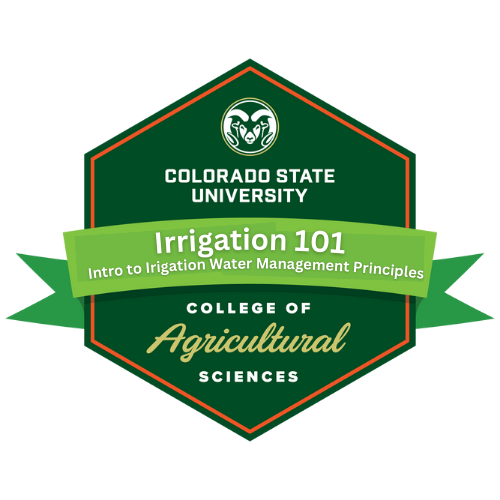
- Teacher: Allan Andales
- Teacher: Tamla Blunt
- Teacher: Deana Namuth-Covert
- Teacher: Dessa Watson
Summary: The goal of irrigation is to add water to the soil where the plant roots are actively growing (the root zone). The soil serves as a water reservoir, from which plants can withdraw water needed for growth. In irrigation management, it is necessary to know the characteristics of the soil in the area that you will be irrigating. These soil characteristics can be used to determine the amount of water in the root zone that is available to the plants.
After completing this lesson, you will be able to:
- Describe the concept of depth of water.
- Determine the depth of water that is available to the plants.
- Use the concept of depth of water to estimate the net irrigation requirement (i.e., soil water deficit) of the soil root zone.
Time Required: We estimate it will take you 2 hours in total to complete the lesson. You can work on it at your own pace and do not have to complete it in one setting.
Who Would Benefit: A variety of people will find this upskilling course useful from adults to high school students. This includes careers (or hobbyists) growing plants (ie field crops, greenhouse production, turf and lawns, gardens, etc.) and wishing to save money and water by better timing irrigation applications.
Upskill Credentials: If you finish the entire course including passing a final quiz (which you can take up to 3 times), then you will earn a badge certificate of completion. It has been approved for 2 Soil and Water Management CEUs through the national Certified Crop Adviser program.
Instructor: Dr. Allan A. Andales is a Professor and Extension Specialist of Irrigation and Water Science in the Department of Soil and Crop Sciences, Colorado State University (CSU). He has a joint appointment in the Department of Civil and Environmental Engineering. Dr. Andales applies principles of soil and water engineering, environmental biophysics, and numerical methods to study the effects of management practices and environmental factors on field hydrology and agricultural production. Experimental data are used to develop computer models and decision support tools that can improve agricultural water use efficiency and water quality. He is a member of the CSU Extension Water Resource Management Team that engages the public in addressing agricultural and urban water issues in Colorado.
ADA Accessibility: We have done our best to follow ADA best practices. Let us know if you run into any problems or require further accommodations.
Acknowledgements: This online micro-credential upskilling course is offered through the CSU Ag Upskilling program. Development was supported in part by funding from the CHS Foundation, administered by Colorado State University (2022). The CHS Foundation, funded by charitable gifts from CHS Inc., is focused on developing a new generation of agriculture leaders for life-long success. Together, with our partners, we are igniting innovation and driving excellence in agriculture education, cultivating high impact programs for rural youth and accelerating potential for careers in agriculture. Learn more at CHS Foundation.
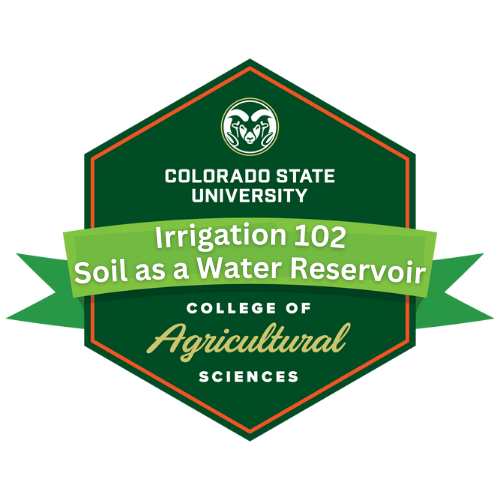
- Teacher: Allan Andales
- Teacher: Deana Namuth-Covert
- Teacher: Dessa Watson
Summary: To effectively utilize limited irrigation resources in the most cost-effective manner requires balancing the inputs and outputs of water fluxes, as well as water that is stored in the soil profile. Best irrigation management scheduling practices focus on water balance in the rootzone because that is where the plant/crop is extracting water (and nutrients) from the soil. It is here we estimate the irrigation water requirements to maintain healthy plants. Decisions on when and how much irrigation water to apply depends on the soil water deficit and the management-allowed depletion (MAD). This lesson will walk you through each of these concepts including real world problem scenarios.
After completing this lesson, you will be able to:
- Use the water balance of the root zone to estimate the irrigation water requirement.
- Make irrigation decisions by comparing the soil water deficit to the management-allowed depletion.
Time Required: We estimate it will take you 2 hours in total to complete the lesson. You can work on it at your own pace and do not have to complete it in one setting.
Who Would Benefit: A variety of people will find this upskilling course useful from adults to high school students. This includes careers (or hobbyists) growing plants (ie field crops, greenhouse production, turf and lawns, gardens, etc.) and wishing to save money and water by better timing irrigation applications.
Upskill Credentials: If you finish the entire course including passing a final quiz (which you can take up to 3 times), then you will earn a badge certificate of completion. This has also been approved for 2 Soil and Water Management CEUs through the national Certified Crop Adviser program.
Instructor: Dr. Allan A. Andales is a Professor and Extension Specialist of Irrigation and Water Science in the Department of Soil and Crop Sciences, Colorado State University (CSU). He has a joint appointment in the Department of Civil and Environmental Engineering. Dr. Andales applies principles of soil and water engineering, environmental biophysics, and numerical methods to study the effects of management practices and environmental factors on field hydrology and agricultural production. Experimental data are used to develop computer models and decision support tools that can improve agricultural water use efficiency and water quality. He is a member of the CSU Extension Water Resource Management Team that engages the public in addressing agricultural and urban water issues in Colorado.
ADA Accessibility: We have done our best to follow ADA best practices. Let us know if you run into any problems or require further accommodations.
Acknowledgements: This online micro-credential upskilling course is offered through the CSU Ag Upskilling program. Development was supported in part by funding from the CHS Foundation, administered by Colorado State University (2022). The CHS Foundation, funded by charitable gifts from CHS Inc., is focused on developing a new generation of agriculture leaders for life-long success. Together, with our partners, we are igniting innovation and driving excellence in agriculture education, cultivating high impact programs for rural youth and accelerating potential for careers in agriculture. Learn more at CHS Foundation.
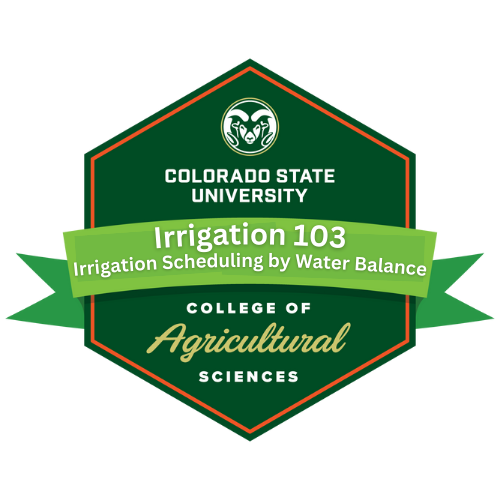
- Teacher: Allan Andales
- Teacher: Deana Namuth-Covert
- Teacher: Dessa Watson
Summary: When making decisions about when to irrigate a crop, no matter the specific plant or scenario, it is important to take into consideration evapotranspiration rates which provide an estimate of water flux out of your system. The challenge is that evapotranspiration varies a lot depending on the specific plant, its growth stage plus changing weather (or greenhouse) conditions. Precision agriculture scientists have been able to characterize two reference crop values as a way to standardize evapotranspiration calculations based on weather data. In this lesson you will learn what is meant by a reference crop, crop coefficient, and water stress coefficient and how you can use these to inform your irrigation management decisions.
Time Required: We estimate it will take you 2 hours to complete the lesson. You can work on it at your own pace and do not have to complete it in one setting.
Who Would Benefit: A variety of people will find this upskilling course useful from adults to high school students. This includes careers (or hobbyists) growing plants (ie field crops, greenhouse production, turf and lawns, gardens, etc.) and wishing to save money and water by better timing irrigation applications.
Upskill Credentials: If you finish the entire course including passing a final quiz (which you can take up to 3 times), then you will earn a badge certificate of completion. It has been approved for 2 Soil and Water Management CEUs through the national Certified Crop Adviser program.
Instructor: Dr. Allan A. Andales is a Professor and Extension Specialist of Irrigation and Water Science in the Department of Soil and Crop Sciences, Colorado State University (CSU). He has a joint appointment in the Department of Civil and Environmental Engineering. Dr. Andales applies principles of soil and water engineering, environmental biophysics, and numerical methods to study the effects of management practices and environmental factors on field hydrology and agricultural production. Experimental data are used to develop computer models and decision support tools that can improve agricultural water use efficiency and water quality. He is a member of the CSU Extension Water Resource Management Team that engages the public in addressing agricultural and urban water issues in Colorado.
ADA Accessibility: We have done our best to follow ADA best practices. Let us know if you run into any problems or require further accommodations.
Acknowledgements: This online micro-credential upskilling course is offered through the CSU Ag Upskilling program. Development was supported in part by funding from the CHS Foundation, administered by Colorado State University (2022). The CHS Foundation, funded by charitable gifts from CHS Inc., is focused on developing a new generation of agriculture leaders for life-long success. Together, with our partners, we are igniting innovation and driving excellence in agriculture education, cultivating high impact programs for rural youth and accelerating potential for careers in agriculture. Learn more at CHS Foundation.


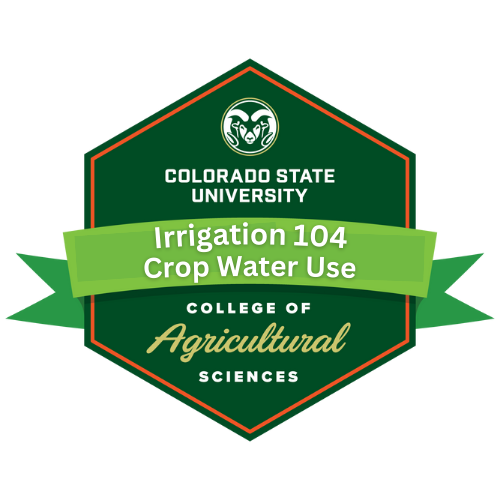
- Teacher: Allan Andales
- Teacher: Deana Namuth-Covert
- Teacher: Dessa Watson
Summary: No matter the particular plant scenario you are working with (ie field crop, pastureland, Greenhouse business, turf grass, home garden and landscaping, etc.) being able to accurately estimate the water needs and timing of irrigation will help lower costs, as well as preserve limited water supplies. In this lesson you will learn how to use a specific irrigation app which has been developed by a group of public researchers and is free for your use. This app, along with the foundational irrigation principles you learned in previous lessons and/or from your previous knowledge will help you maximize the effects of your irrigation applications while minimizing costs. This lesson uses a Colorado field example.
After completing this lesson, you will be able to:
- Set up a field in the Water Irrigation Scheduler for Efficient Application (WISE) App to schedule irrigations during one growing season.
- Input irrigation amounts in WISE based on estimated soil water deficits (D) and the crop’s management allowed depletion (MAD) during one growing season.
- Interpret the WISE water balance outputs.
Time Required: We estimate it will take you 2 hours to complete the lesson. You can work on it at your own pace and do not have to complete it in one setting.
Who Would Benefit: A variety of people will find this upskilling course useful from adults to high school students. This includes careers (or hobbyists) growing plants (ie field crops, greenhouse production, turf and lawns, gardens, etc.) and wishing to save money and water by better timing irrigation applications.
Upskill Credentials: If you finish the entire course including passing a final quiz (which you can take up to 3 times), then you will earn a badge certificate of completion. It has been approved for 2 Crop Management CEUs through the national Certified Crop Adviser program.
Instructor: Dr. Allan A. Andales is a Professor and Extension Specialist of Irrigation and Water Science in the Department of Soil and Crop Sciences, Colorado State University (CSU). He has a joint appointment in the Department of Civil and Environmental Engineering. Dr. Andales applies principles of soil and water engineering, environmental biophysics, and numerical methods to study the effects of management practices and environmental factors on field hydrology and agricultural production. Experimental data are used to develop computer models and decision support tools that can improve agricultural water use efficiency and water quality. He is a member of the CSU Extension Water Resource Management Team that engages the public in addressing agricultural and urban water issues in Colorado.
ADA Accessibility: We have done our best to follow ADA best practices. Let us know if you run into any problems or require further accommodations.
Acknowledgements: This online micro-credential upskilling course is offered through the CSU Ag Upskilling program. Development was supported in part by funding from the CHS Foundation, administered by Colorado State University (2022). The CHS Foundation, funded by charitable gifts from CHS Inc., is focused on developing a new generation of agriculture leaders for life-long success. Together, with our partners, we are igniting innovation and driving excellence in agriculture education, cultivating high impact programs for rural youth and accelerating potential for careers in agriculture. Learn more at CHS Foundation.


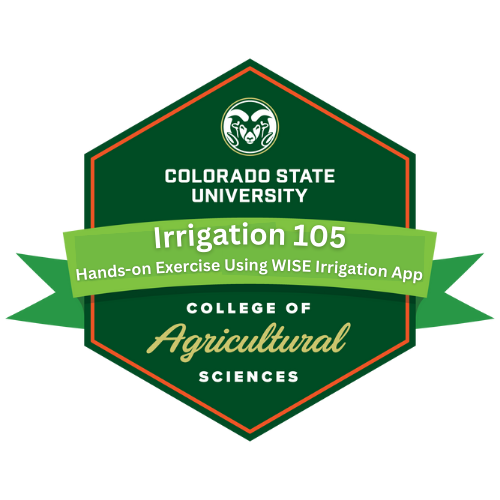
- Teacher: Allan Andales
- Teacher: Deana Namuth-Covert
- Teacher: Dessa Watson
Development of this Badge was supported in part by funding from the CHS Foundation, administered by Colorado State University (2022). The CHS Foundation, funded by charitable gifts from CHS Inc., is focused on developing a new generation of agriculture leaders for life-long success. Together, with our partners, we are igniting innovation and driving excellence in agriculture education, cultivating high impact programs for rural youth and accelerating potential for careers in agriculture.
Learn more at CHS Foundation.
Email Dessa.Linsley@colostate.edu to receive an access key code and course instructions.

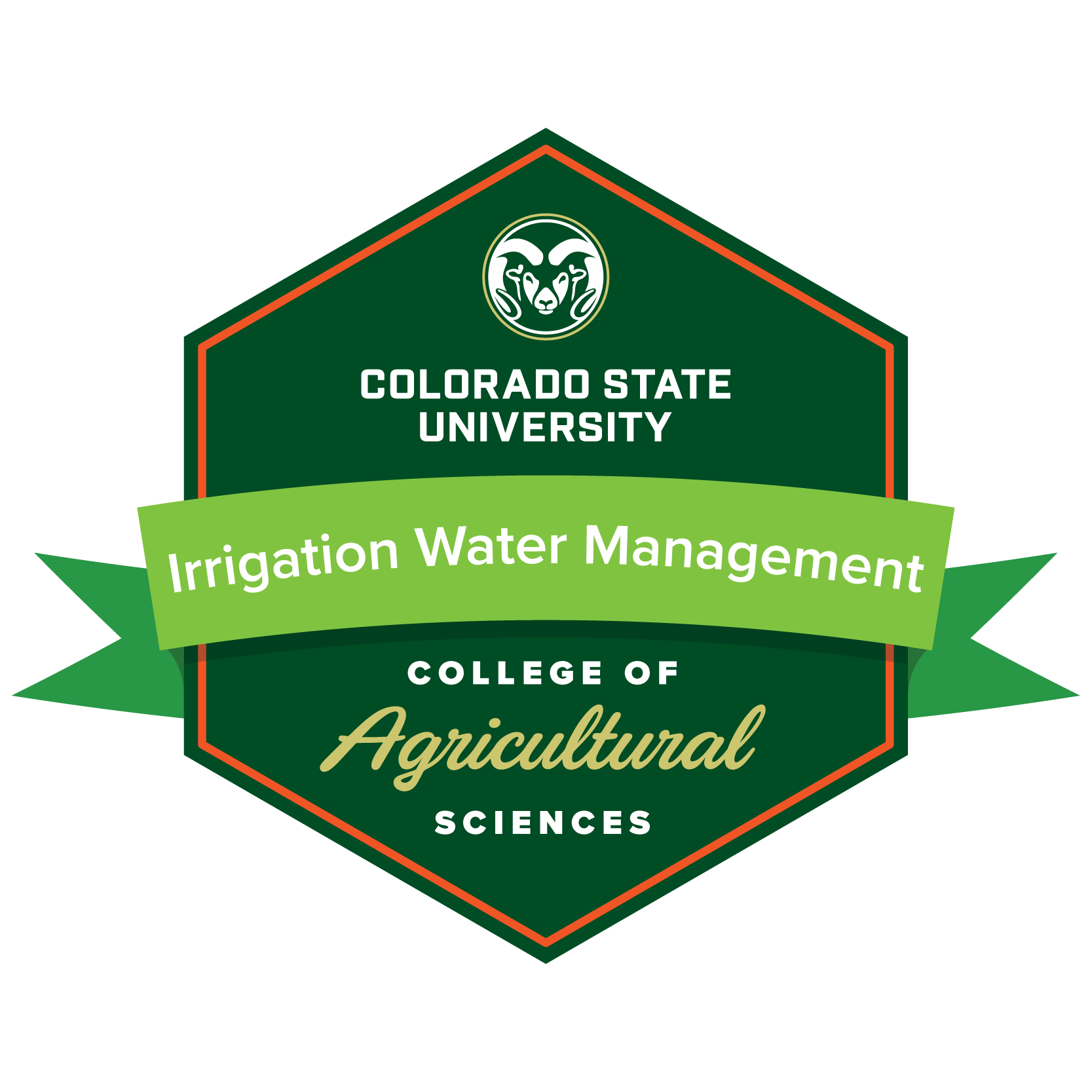
- Teacher: Tamla Blunt
- Teacher: Deana Namuth-Covert
- Teacher: Dessa Watson
Summary: Seed that comes from the field is never pure, it contains sticks, stems, debris, soil, weed and other crop seeds, trash, and insects. In its simplest form, conditioning is the process of cleaning the seed and removing impurities and contaminates so that the end user receives pure, high-quality seed ready for planting. This course is first in a series which will walk you through foundational concepts of seed conditioning.
Upskill Credentials: If you finish the entire course including passing the quiz with a score of 80% or better (which you can take up to 3 times) and filling out the short 5 mins feedback survey, then you will earn a badge certificate of completion. This course is under review for CEUs through the national Certified Crop Adviser program.
Time Required: We estimate it will take you 1-2 hours in total to complete the course. You can work on it at your own pace and do not have to complete it in one setting. Click on the eBook link below to begin.
ADA Accessibility: We have done our best to follow ADA best practices. Let us know if you run into any problems or require further accommodations.
If you have any questions, please contact your instructor, Laura Pottorff, M.S., Director of Seed Program at: Laura.Pottorff@colostate.edu
Acknowledgements: This online micro-credential upskilling course is offered through the CSU Ag Upskilling program. Development of this content was supported in part by funding from SyncUp Colorado, administered by Colorado State University (2022).
- Teacher: Tamla Blunt
- Teacher: Deana Namuth-Covert
- Teacher: Rick Novak
- Teacher: Laura Pottorff
- Teacher: Dessa Watson
Summary: Seed conditioners play a unique role in modern seed production. Conditioners have the power to increase the quality of poor seed, and decrease the quality of good seed. While a grower has the ability to fine tune the conditions under which the seed crop is grown with fertilizer and water inputs, pest control and tillage to maximize quality, it is up to the conditioner to create the highest quality product out of what they are given. This course is second in a series which will walk you through foundational concepts of seed conditioning.
Upskill Credentials: If you finish the entire course including passing the quiz with a score of 80% or better (which you can take up to 3 times) and filling out the short 5 mins feedback survey, then you will earn a badge certificate of completion. This course is under review for CEUs through the national Certified Crop Adviser program.
Time Required: We estimate it will take you 1-2 hours in total to complete the course. You can work on it at your own pace and do not have to complete it in one setting. Click on the eBook link below to begin.
ADA Accessibility: We have done our best to follow ADA best practices. Let us know if you run into any problems or require further accommodations.
If you have any questions, please contact your instructor, Laura Pottorff, M.S., Director of Seed Program at: Laura.Pottorff@colostate.edu
Acknowledgements: This online micro-credential upskilling course is offered through the CSU Ag Upskilling program. Development of this content was supported in part by funding from SyncUp Colorado, administered by Colorado State University (2022).


- Teacher: Tamla Blunt
- Teacher: Heide. Keeble
- Teacher: Daniel Lynch
- Teacher: Deana Namuth-Covert
- Teacher: Rick Novak
- Teacher: Laura Pottorff
- Teacher: Marissa Spear
- Teacher: Dessa Watson
This CSU Badge introduces foundation principles on how internet-of-things (IoT) technology and sensors can be used to provide real-time soil moisture and weather data, allowing growers to improve the timing and amounts of irrigation – saving water and avoiding plant water stress. These general principles are applicable to either landscape or agriculture irrigation sectors, including a wide range of scenarios such as efficiently watering a backyard garden, growing vegetables in a greenhouse, maintaining golf courses and lawns, as well as irrigating large crop fields. Using a kit containing sensors and a wireless IoT microcontroller, participants will gaine hands-on experience building, programming, and using their own IoT (i.e, sensor-based) system to monitor soil water levels based on real-time data. Using an experiential learning approach, learners will gain new knowledge on how IoT sensor technology and the resulting real-time data can be leveraged to improve irrigation decisions and save water. Program was funded in part by the CHS Foundation and Colorado State University.


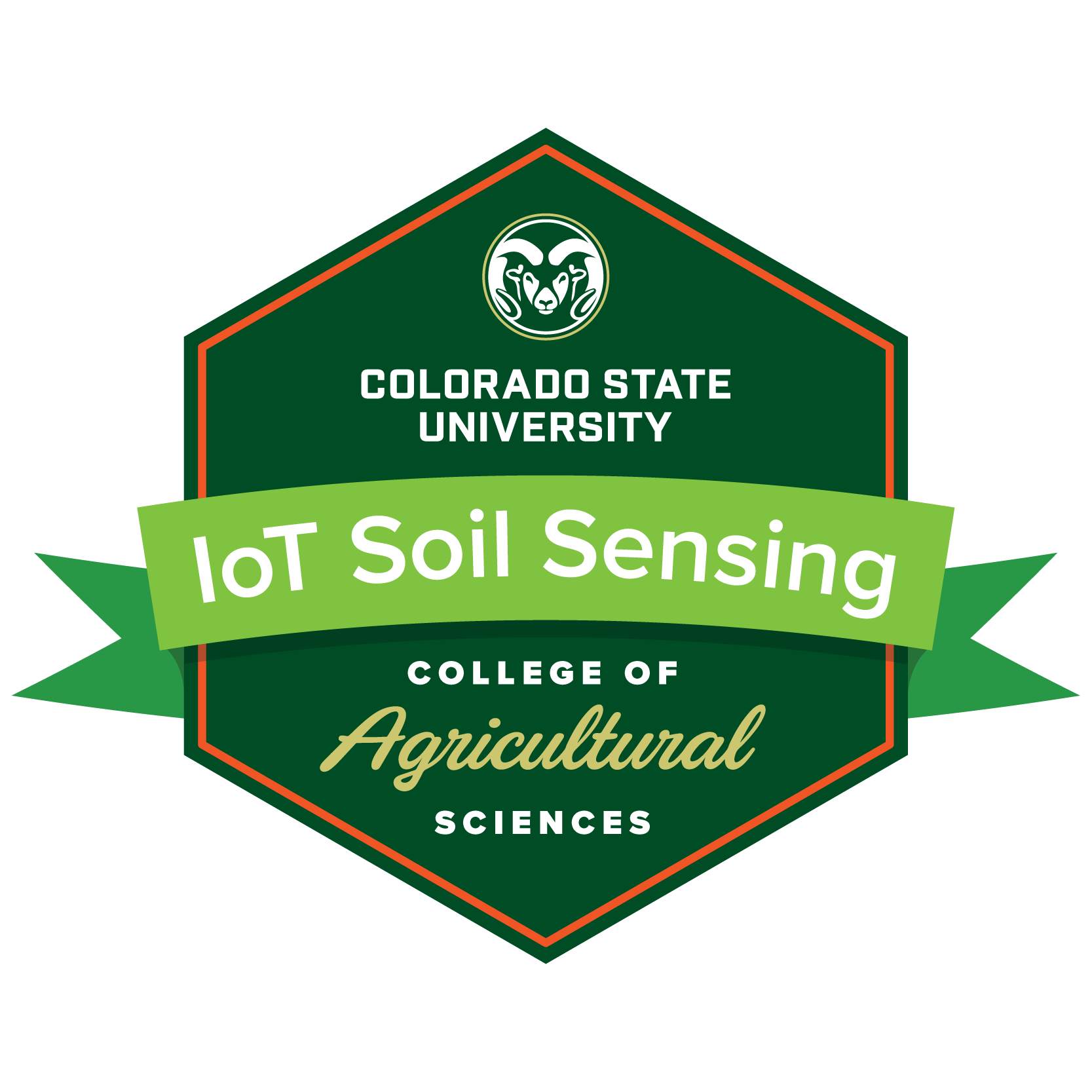
- Teacher: Deana Namuth-Covert
- Teacher: Dessa Watson
Curso de Cuidado y Manejo del Caballo para Vaqueros y Procesadores - Versión en Español es ofrecido por la Corporación HorseQuest para el público en general, productores de ganado de engorda y empleados que aprenderán cómo manejar con seguridad los caballos (horses) cuando se trabaja en los corrales de alimentación (feedlot), así como también el cuidado y manejo básica del caballo.
Para obtener más información o para inscribirse contacte a Kathy Anderson, en la Universidad de Nebraska-Lincoln, a la dirección de correo electrónico: kanderson1@unl.edu
Para asistencia técnica por favor contacte campushelp@extension.org
Este curso requiere una cuota de inscripción de $25. Una vez pagada la cuota de inscripción, recibirá un correo electrónico con la clave de acceso.
Por favor, vaya a: Pen Rider and Processors Horse Safety and Care Certification Course (http://marketplace.unl.edu/extension/programs/feedlot-horse.html) para registrarse.
- Teacher: Kathy Anderson
- Teacher: Colleen Brady
This class, developed by Ohio State University Extension Family and Consumer Sciences Educators/Program and Field Specialists, reviews many topics covered in the face-to-face Dining with Diabetes class. However, this class goes "beyond the kitchen" to help you make healthy choices when eating out and grocery shopping.
You can share ideas and experiences with your classmates, chat with a health professional, and learn about new technology including websites and mobile apps.
You have access to three modules that you can work through at your own pace. The first module addresses carbohydrates and diabetes. The second covers fats and sodium, and the third explains the role of vitamins, minerals and fiber.For more information contact Dr. Dan Remley at remley.4@osu.edu
- Teacher: Marie Economos
- Teacher: Jonathan Gladden
- Teacher: Jenny Lobb
- Teacher: Dan Remley
- Teacher: Joyce Riley
- Teacher: Shannon Smith
Eastern Bees 101 is a certificate course that focuses on bees of the Eastern U.S. and Canada. This course was developed for bee enthusiasts who want to explore the biology, natural history and identification characteristics of wild bees. Through readings, video lessons, quizzes and other strategies, participants will gain a fundamental understanding of wild bees, including basic lifestyles and survival strategies, how to tell bees from wasps and flies, and what makes bees key pollinators. The course focuses on five groups of bees to present bee terminology and identification characteristics in a way beginners will find accessible, but with a depth that will also interest intermediate bee enthusiasts.
Eastern Bees 101 was developed by author and bee biologist Olivia Carril (co-author of The Bees in Your Backyard) and OSU Extension educator Denise Ellsworth.
Course specifics:
Five course Sections
- Discovering Wild Bees
- Bee Biology
- Carpenter Bees and Bumble Bees
- Wool Carder Bees and Green Metallic Sweat Bees
- Honey Bees
Course text: The Bees in Your Backyard not provided. Learners must acquire a copy of the text.
Estimated time to complete the course, not including readings: 10 - 15 hours.
Requirement for certification: passing grades on all quizzes, completion of one assignment in each section, participation in group forums including creating and commenting on posts.
Cost to participate: no cost for Ohio Pollinators On-Line course participants
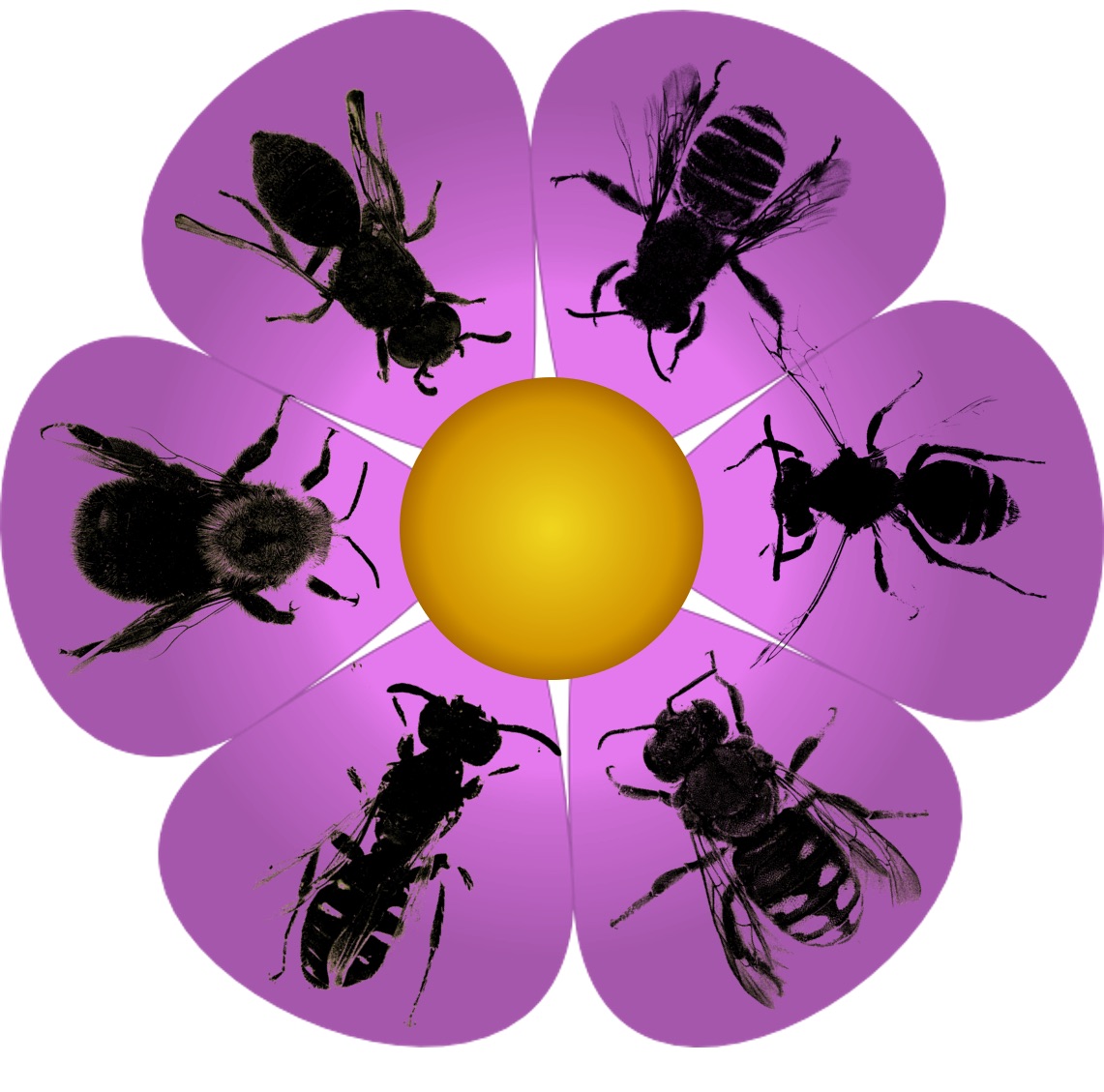
- Instructor: Denise Ellsworth
- Instructor: Olivia Messinger Carril

Early Childhood Workforce Training 2024
Child Development: Three to Five
This module will focus on the preschool years ages three to five, when there is an enormous amount of growth and development. Our role in supporting children's progress is critical. What each of us does makes a difference. Topics include: Brain Development, Developmental Domains, the Role of the Teacher and Positive Interactions.
Click on the title of the course above, then go to "enroll me" and click to begin the course.
For Technical support email: campushelp@extension.org
Instructor email: cpeshlakai@unr.edu
- Teacher: Danielle Pertile
- Teacher: Cathryn Peshlakai
- Teacher: Sarah Wright

Early Childhood Workforce Training 2024
Recognize and Report Child Abuse
The focus of this course is to help childcare providers become familiar with the difficult subject of child abuse and neglect. In this course you will learn about:
- Four general types of child maltreatment
- Possible indicators of abuse and neglect
- When and where to report suspected child abuse or neglect
- What to include in a report of suspected child maltreatment
- How to respond when a child discloses abuse or neglect
- Important policies regarding child abuse and neglect in childcare setting
Click on the title of the course above, then go to "enroll me" and click to begin the course.
For Technical support, email: campushelp@extension.org
Instructor email: cpeshlakai@unr.edu
- Teacher: Cynthia James
- Teacher: Stephanie May
- Teacher: Danielle Pertile
- Teacher: Cathryn Peshlakai
- Teacher: Monica Salazar
- Teacher: Sarah Wright

Early Childhood Workforce Training 2024
Emergency Preparedness for Early Childhood Programs
Being prepared for emergencies can make a big difference as to whether or not the children in your care and the staff in your program remain safe. In this course, you will learn about the necessary steps a program should take to ensure preparedness in the event of an emergency, as well as effective strategies to communicate your emergency plan to children, parents and staff.
Click on the title of the course above, then go to "enroll me" and click to begin the course.
For Technical support email: campushelp@extension.org
Instructor email: cpeshlakai@unr.edu
- Teacher: Cynthia James
- Teacher: Stephanie May
- Teacher: Danielle Pertile
- Teacher: Cathryn Peshlakai
- Teacher: Sarah Wright

EC Workforce Training 2024
Medication Administration and the Prevention of and Response to Food and Other Allergies in the Child Care Environment
This course is designed to provide childcare providers with information that will help safely administer medications to children in your program. This course is for childcare providers who administer medication to children but are not licensed health care professionals.
- Teacher: Cynthia James
- Teacher: Stephanie May
- Teacher: Danielle Pertile
- Teacher: Cathryn Peshlakai
- Teacher: Monica Salazar
- Teacher: Chelsie Shurtleff
- Teacher: Sarah Wright
- Teacher: Teresa Byington
- Teacher: Cathryn Peshlakai
- Teacher: Sarah Wright

Early Childhood Workforce Training 2024
Positive Guidance
This module will present the goals of positive guidance, misunderstandings about guidance, key practices, effective environments, common behavior challenges and offer positive guidance strategies for the classroom
Click on the title of the course above, then go to "enroll me" and click to begin the course.
For Technical support email: campushelp@extension.org
Instructor email: cpeshlakai@unr.edu
- Teacher: Danielle Pertile
- Teacher: Cathryn Peshlakai
- Teacher: Sarah Wright
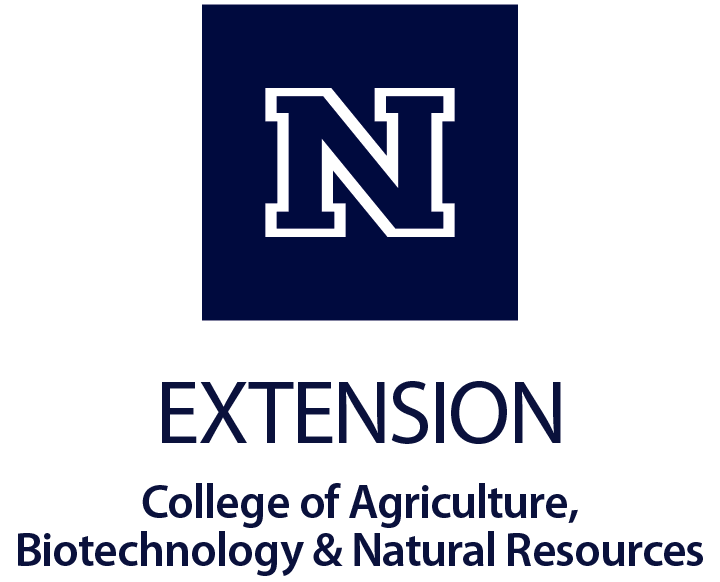
Early Childhood Workforce Training 2024
Prevention of Shaken Baby Syndrome and Abusive Head Trauma
This training describes causes, symptoms and consequences of Shaken Baby Syndrome/Abusive Head Trauma (SBS/AHT). The lesson further provides information on caring for a crying baby and how to cope with a baby who cries inconsolably.
Click on the title of the course above, then go to "enroll me" and click to begin the course.
For Technical support, email: campushelp@extension.org
Instructor email: cpeshlakai@unr.edu
- Teacher: Cynthia James
- Teacher: Stephanie May
- Teacher: Danielle Pertile
- Teacher: Cathryn Peshlakai
- Teacher: Sarah Wright

Early Childhood Workforce Training 2024
Signs and Symptoms of Illness (SOI) including Blood Borne Pathogens
Signs and Symptoms of Illness (SOI) including Blood Borne Pathogens: The Prevention and Control of Communicable Diseases in the Child Care Setting is for child care providers and early childhood educator.
This training discusses ways to recognize, prevent, and manage infectious diseases in early education and child care settings. Special precautions are discussed when handling bloodborne pathogens.
Click on the title of the course above, then go to "enroll me" and click to begin the course.
For Technical support email: campushelp@extension.org
Instructor email: cpeshlakai@unr.edu
- Teacher: Cynthia James
- Teacher: Stephanie May
- Teacher: Danielle Pertile
- Teacher: Cathryn Peshlakai
- Teacher: Monica Salazar
- Teacher: Sarah Wright

Early Childhood Workforce Training 2024
Supporting Young Dual Language Learners
This training will provide participants with an understanding of young children who are dual language learners. We will explore the developmental domains and the stages of language development. Strategies will be presented for supporting home language and teaching strategies in the classroom.
Click on the title of the course above, then go to "enroll me" and click to begin the course.
For Technical support email: campushelp@extension.org
Instructor email: cpeshlakai@unr.edu
- Teacher: Cathryn Peshlakai
- Teacher: Sarah Wright

Early Childhood Workforce Training 2024
Transportation Safety
This course presents recommended practices and policies for the safe transport of young children to and from childcare programs.
Click on the title of the course above, then go to "enroll me" and click to begin the course.
For Technical support email: campushelp@extension.org
Instructor email: cpeshlakai@unr.edu
- Teacher: Cynthia James
- Teacher: Stephanie May
- Teacher: Danielle Pertile
- Teacher: Cathryn Peshlakai
- Teacher: Monica Salazar
- Teacher: Sarah Wright

Early Childhood Workforce Development 2024
Child Developmnet: Birth to three Years
This module will focus on the first three years of a child's life, when there is an enormous amount of growth and development. Our role in supporting children's progress is critical. What each of us does makes a difference. Topics include: Brain Development, Developmental Domains, the Role of the Teacher and Positive Interactions.
Click on the title of the course above, then go to "enroll me" and click to begin the course.
For Technical support email: campushelp@extension.org
Instructor email: cpeshlakai@unr.edu
- Teacher: Danielle Pertile
- Teacher: Cathryn Peshlakai
- Teacher: Sarah Wright

Early Childhood Workforce Training 2023
Reducing the Risks of Sudden Infant Death Syndrome (SIDS)
Reducing the Risks of Sudden Infant Death Syndrome (SIDS)training is for Child Care Providers and Early Childhood Educators. This training discusses ways to lower the risk of SIDS in child care settings, addresses common beliefs, safe sleep practices, handling parent’s concerns and why some babies are at a higher risk for SIDS. This training promotes “Back to Sleep” and “Tummy to Play”.This training has been approved by Nevada Registry and the State of Maryland, Office of Child Care.
Click on the title of the course above, then go to "enroll me" and click to begin the course.
For Technical support email: campushelp@extension.org
Instructor email: cpeshlakai@unr.edu
- Teacher: Cynthia James
- Teacher: Stephanie May
- Teacher: Danielle Pertile
- Teacher: Cathryn Peshlakai
- Teacher: Monica Salazar
- Teacher: Sarah Wright

Early Childhood Workforce Training 2024
Wellness-Obesity, Nutrition and Physical Activity
Wellness-Obesity, Nutrition & Physical Activity is for Early Childhood Educators. This training focuses on lifelong wellness related to childhood obesity in the early childhood environment.
Click on the title of the course above, then go to "enroll me" and click to begin the course.
For Technical support email: campushelp@extension.org
Instructor email: cpeshlakai@unr.edu
- Teacher: Cynthia James
- Teacher: Stephanie May
- Teacher: Danielle Pertile
- Teacher: Cathryn Peshlakai
- Teacher: Monica Salazar
- Teacher: Sarah Wright

EC Workforce Training 2024
Building and Physical Premises Safety Including the Storage and
Handling of Bio-Contaminants and Hazardouse Materials
Click on the title of the course above, then go to "enroll me" and click to begin the course.
For Technical support email: campushelp@extension.org
Instructor email: cpeshlakai@unr.edu
This training can be taken to meet the initial training requirement for Buillding and Physical Premisis Safety approved by NV Registry.
- Teacher: Cynthia James
- Teacher: Stephanie May
- Teacher: Danielle Pertile
- Teacher: Cathryn Peshlakai
- Teacher: Monica Salazar
- Teacher: Chelsie Shurtleff
- Teacher: Sarah Wright
In this section on training, efforts will be made to explain and simplify the process of developing a relationship with the horse where communication is simple and straightforward for both the horse and rider.
For information contact Colleen Brady, bradyc@purdue.edu.
The fee for this course is $10. To purchase and enroll in the course, click the following button.
If you purchase at least $40 worth of courses from this category, you can receive a 20% discount by entering the voucher code of HorseQuest20.
- Teacher: Kathy Anderson
- Teacher: Colleen Brady
- Teacher: Kris Hiney
eLearn Urban Forestry is a self-led, online, distance learning program geared speciifcally toward beginning urban foresters and those allied professionals working in and around urban and urbanizing landscapes, including service foresters, natural resource planners, landscape architects, city officials and public works employees. The program is comprised of ten learning modules: The Benefits and Costs of the Urban Forest; Tree Growth and Development; Urban Soils; Site, Tree Selection and Planting; Arboriculture; Assessing and Managing Tree Risk; Tree Disorder Diagnosis and Management; Trees and Construction; Public Policy and Urban Forestry; and Urban Forest Management.
For more information or to enroll, contact Leslie Boby, Southern Regional Extension Forestry, University of Georgia at lboby@sref.info.
- Teacher: Leslie Boby
This course is self-directed with instructor feedback on module assignments. There will be a fee. The audience is people who are interested in starting a vegetable farm enterprise in Piedmont North Carolina. This course is a prerequisite to participating in the Elma C Lomax farm incubator program. Our goal is for people who participate in the farm incubator program to experientially learn vegetable production and build a marketing strategy and clientele. Eventually we hope the participating farmers will leave Lomax to run their own farm. For information and to enroll contact: Robert Furr, North Carolina Extension, by email at rbfurr@ncsu.edu or by calling 704-920-3320
- Teacher: Robert Furr
For more information contact Kathy Anderson, University of Nebraska–Lincoln, at kanderson1@unl.edu
The fee for this course is $10. To purchase and enroll in the course, click the following button.
If you purchase at least $40 worth of courses from this category, you can receive a 20% discount by entering the voucher code of HorseQuest20.
- Teacher: Kathy Anderson
- Teacher: Colleen Brady
- Teacher: Kris Hiney
- Teacher: Laura Kenny

